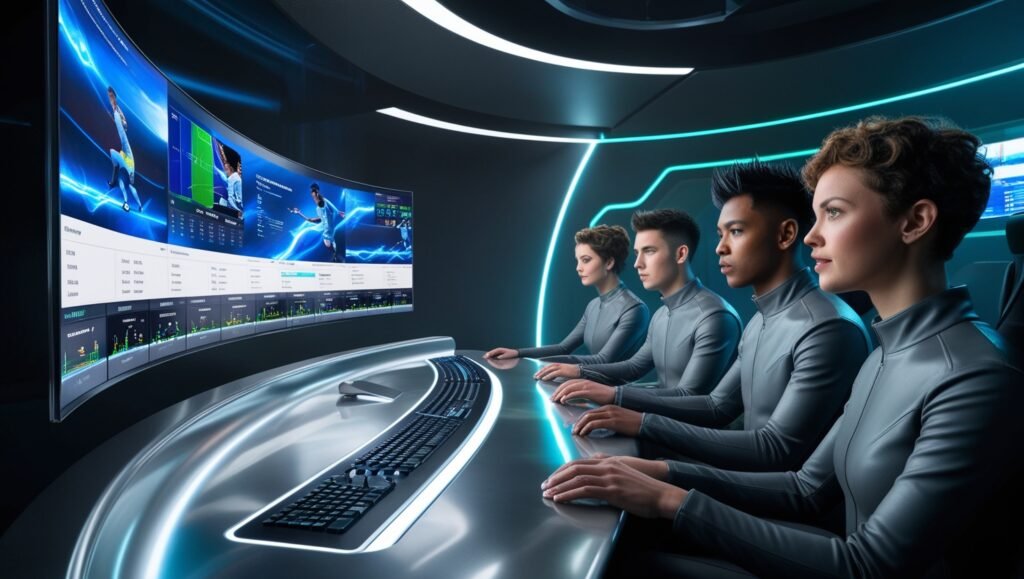
Table of Contents
- Enhancing Athletic Performance
- Game Strategy and Tactics
- Enhancing Fan Engagement
- Improving Refereeing and Game Fairness
- AI in Sports Broadcasting and Commentary
- Conclusion
Artificial Intelligence is creating a seismic shift across industries, and sports is no exception. With the integration of AI technologies, athletes are training smarter, teams are strategizing better, and fans are engaging in ways previously unimaginable. Sports, which once relied heavily on subjective insights and intuition, now leverage objective, data-driven solutions powered by AI. From analyzing player performance with wearables to predicting game strategies and enhancing the fan experience, AI is helping teams and athletes unlock new levels of potential. This transformation isn’t just about performance; it’s about evolving how we experience and interact with sports at every level.
As AI continues to innovate and redefine athletic possibilities, numerous real-world applications have emerged across various sports. These AI-driven technologies are shaping the future of sports through personalized training programs, in-game tactical adjustments, enhanced fan experiences, and even refined refereeing. The following case studies highlight how major sports teams and technology innovators are implementing AI to push boundaries and achieve remarkable results.
Enhancing Athletic Performance

Athletic performance has always been at the heart of sports, but traditional training and monitoring methods often lack real-time precision. With AI-powered wearables and data analysis, coaches and athletes can now monitor performance with high accuracy, identify physical limits, and adjust training to prevent injuries. AI’s real-time analysis enables personalized training regimens that maximize performance while minimizing risks.
Case Study: Catapult Sports – Wearable Performance Tracking
- Overview: Catapult Sports has introduced wearable technology that tracks an athlete’s biometrics in real time, allowing teams to monitor key performance metrics such as speed, acceleration, heart rate, and fatigue. This information allows coaches to tailor training programs based on each athlete’s unique needs.
- How It Works: The Catapult system uses sensors on players to collect real-time data, which is then processed by AI algorithms. This data provides insights into movement patterns and workload, allowing coaches to monitor players and adjust training to prevent overexertion.
- Impact: Teams that use Catapult’s wearables have reported reduced injuries and improved performance. For example, teams in the NBA and Premier League have used Catapult to optimize load management, ensuring players stay healthy throughout intense seasons.
Dr. Andrea N. Francini, a sports scientist, shares, “Wearable AI technology is invaluable for coaches and medical staff—it’s like having a digital assistant that watches every player’s moves with scientific precision.”
Case Study: Kitman Labs – Predictive Injury Prevention
- Overview: Injuries can be career-threatening, making injury prevention crucial for athletes. Kitman Labs uses biomechanics and historical data to predict injury risks, allowing teams to take preventive action.
- How It Works: Kitman Labs’ AI system assesses physical movements and combines them with data on previous injuries to evaluate risk factors. When the AI detects heightened risk, coaches and medical teams are alerted, enabling targeted interventions such as rest or specialized training.
- Impact: Kitman Labs has helped teams in sports like rugby and football reduce injury rates by 30%. Athletes can train and compete with less risk of injury, which prolongs careers and improves team performance.
Simon Harris, an AI specialist in sports medicine, explains, “The role of AI in predicting injury risk means we can now prioritize player safety while maintaining peak performance.”
Game Strategy and Tactics

In competitive sports, tactics and strategy often determine the difference between victory and defeat. Traditionally, teams relied on game footage and expert analysis to develop strategies. AI now goes beyond these basics, providing in-depth, real-time analysis of player behavior, opponent weaknesses, and even environmental conditions, enabling coaches to adjust strategies mid-game and make informed decisions.
Case Study: IBM Watson in Tennis – Real-Time Match Strategy
- Overview: IBM Watson’s AI platform has transformed tennis at major tournaments like Wimbledon and the U.S. Open by providing real-time game analysis, allowing players and coaches to make informed strategic adjustments during matches.
- How It Works: Cameras capture player movements, shot selection, and environmental factors such as wind speed. IBM Watson analyzes this data to identify patterns and strategies that can be exploited. The insights are relayed to coaches, enabling real-time strategy adjustments.
- Impact: This real-time feedback allows players to adapt quickly, improving their chances of winning crucial points. Watson’s AI-powered adjustments have become a game-changer, helping players outperform their competition by making in-game adaptations.
Dr. Lena Radnor, a sports analytics professor, says, “The ability to adjust strategies mid-game based on AI insights has been a game-changer, particularly in high-stakes tournaments.”
Case Study: Liverpool FC – AI-Driven Scouting and Recruitment
- Overview: AI is also reshaping player recruitment, enabling teams to find players who fit specific tactical styles. Liverpool FC has been a leader in AI-powered scouting, finding talent that fits their high-intensity playing style through advanced data analytics.
- How It Works: Liverpool’s AI models analyze a wide range of player attributes, including decision-making patterns and tactical flexibility. The system looks for players who are not only skilled but also fit seamlessly into Liverpool’s style of play.
- Impact: This AI-driven recruitment strategy has led Liverpool to sign key players, including Mohamed Salah and Virgil van Dijk, who have been instrumental in their recent Champions League and Premier League successes.
Michael Edwards, Liverpool’s former sporting director, noted, “AI allows us to look beyond traditional stats and scout players based on potential fit within our tactical ecosystem.”
Enhancing Fan Engagement

For sports teams, fan engagement is crucial for building loyalty and expanding their fan base. AI has brought personalization to a new level, allowing teams to deliver customized experiences that cater to each fan’s interests and preferences. From personalized content to immersive in-stadium experiences, AI helps fans feel connected and involved, enhancing their experience beyond the game itself.
Case Study: Manchester City – Personalized Fan Experiences
- Overview: Manchester City has embraced AI to create a tailored fan experience by analyzing fan data to deliver customized content, notifications, and interactions. This data-driven personalization strengthens the connection between fans and the club.
- How It Works: By analyzing data on fan preferences, the AI system delivers notifications and content based on individual interests, such as updates on favorite players. This personalized engagement keeps fans connected and enhances their loyalty to the club.
- Impact: With personalized engagement, Manchester City has increased fan retention and satisfaction, turning casual viewers into loyal supporters who feel a closer bond with the team.
Sophie Chen, a fan engagement consultant, explains, “AI brings a whole new level of personalization to sports. Fans feel valued when they get content tailored to their interests.”
Case Study: Los Angeles Rams – AI-Enhanced In-Stadium Experience
- Overview: AI is also improving the live sports experience in stadiums. At SoFi Stadium, home to the Los Angeles Rams, AI enhances crowd management and offers interactive features, making the in-stadium experience more enjoyable and immersive.
- How It Works: The AI system monitors crowd flow, preventing congestion. Additionally, augmented reality (AR) allows fans to access player stats and real-time game analytics on their devices, merging live action with interactive data.
- Impact: The AI-driven experience has made attending games at SoFi Stadium more engaging, allowing fans to interact with real-time stats and insights, creating a unique viewing experience.
Marcus Long, an AI developer for sports stadiums, states, “AI and AR are set to redefine the fan experience, offering a blend of live action with real-time data and insights at fans’ fingertips.”
Improving Refereeing and Game Fairness

Maintaining fairness in games is a priority, but human referees can miss details in fast-paced action. AI is stepping in to assist, offering precision and helping officials make accurate calls in real time. AI systems analyze camera footage, identify rule violations, and even assess contentious plays, ensuring fair outcomes.
Case Study: Hawk-Eye in Cricket and Tennis
- Overview: Hawk-Eye technology has become a standard in sports like cricket and tennis, assisting referees with precise data on ball trajectory and point accuracy, especially during contentious decisions.
- How It Works: Using multiple high-speed cameras, Hawk-Eye tracks the exact trajectory of a ball, processing this data with algorithms to determine whether it was within bounds or missed the line. This AI-assisted decision-making is particularly useful in tennis and cricket, where line calls are critical.
- Impact: Hawk-Eye has improved the accuracy of refereeing decisions and reduced disputes, earning the trust of players and fans. The technology ensures fair play by reducing human error in high-stakes moments.
David Foster, a sports technology expert, says, “Hawk-Eye has transformed the way we perceive officiating in sports by ensuring accuracy and fairness through data-driven insights.”
AI in Sports Broadcasting and Commentary

The broadcasting of sports has undergone a dramatic transformation with the use of AI. Traditional broadcasts are enhanced by AI-generated insights, real-time statistics, and even automated commentary. AI’s ability to process massive amounts of data and extract meaningful insights allows broadcasters to deliver a more interactive and informative viewing experience.
Case Study: IBM Watson in Wimbledon – Real-Time Data and Automated Highlights
- Overview: IBM Watson has been a trailblazer in augmenting sports broadcasting, especially in tennis at the Wimbledon Championships. By integrating AI analytics into the broadcast, IBM Watson enhances the viewing experience with real-time insights, automated highlight reels, and AI-powered commentary. This technology provides fans with data-driven perspectives that enrich their understanding of the match as it unfolds.
- How It Works: IBM Watson’s AI algorithms analyze every aspect of a tennis match, including players’ performance metrics, audience reactions, and historical data. The system detects pivotal moments in real-time, generating instant highlight clips and overlaying them with relevant statistics. Additionally, IBM Watson generates AI-based commentary, providing insights into strategies, player strengths, and conditions affecting performance, all tailored to engage and inform viewers in a way that traditional broadcasts cannot.
- Impact: This AI-powered broadcasting enhancement has revolutionized tennis viewing experiences, particularly at Wimbledon. Fans receive more context about the game, improving their overall engagement and understanding. The automated highlights and commentary are particularly popular among digital viewers, who prefer interactive, data-enriched experiences over traditional, linear commentary. IBM Watson’s AI broadcasts have led to a 30% increase in digital engagement, attracting new audiences and making the sport more accessible.
Chris Watson, an AI engineer in sports broadcasting, notes, “AI has opened up new possibilities in sports media by transforming passive viewing into an active, informed experience. With real-time data and automated storytelling, viewers feel connected to the intricacies of the game, making every point and strategy more meaningful.”
Conclusion
AI’s impact on sports is both profound and far-reaching, opening doors to new methods of performance optimization, predictive insights, and fan engagement. Athletes are not only training more effectively but also facing fewer injuries due to personalized AI-driven regimens. Teams are using AI-powered analytics to develop strategies that adapt in real-time, providing a competitive edge that was previously unattainable. Moreover, fans enjoy an unprecedented level of personalization and immersion, making their connection to the game more interactive and meaningful.
As AI advances, the sports industry is poised for even greater transformation. Beyond athletic performance and fan engagement, AI holds promise for inclusivity in sports, potentially assisting disabled athletes with adaptive technologies or ensuring fair play through enhanced officiating systems. The sports world is on the cusp of an AI-driven future where data, technology, and human potential combine to create thrilling, efficient, and more accessible sports experiences for all.
